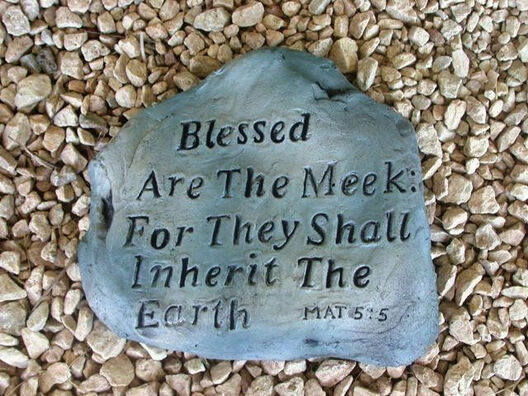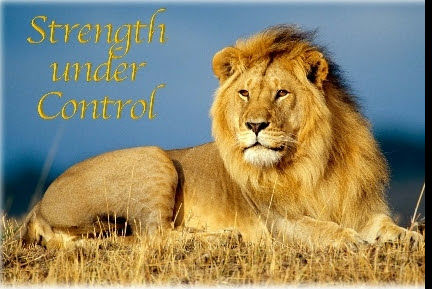You might find it rather challenging, because we misunderstand meekness. In a world that thinks only an aggressive and ambitious person can get ahead in life, it is hard to believe that those who are meek will inherit anything, much less the earth!
Jesus wasn’t implying that being fearful or weak brings happiness. Instead, Jesus was talking about an attitude or an outlook. The meekness he described requires us to be strong people who are grounded in Him
Aristotle defined meekness as the mean between two extremes—intense anger and excessive indifference. It is the happy medium between too much anger and too little passion.
William Barclay, a Scotish minister and Professor of Divinity and Biblical Criticism at the University of Glasgow, suggested that this beatitude should be translated, “Blessed is the man who is always angry at the right time and never angry at the wrong time.”
Meekness maintains an even temperament, which allows us to develop self-control.
The Greek word translated “meekness”, is praus. It was often used to express the idea of “self-control, which is an attribute of the fruit of the Spirit. So the verse could also be translated, “Blessed are they who are entirely self-controlled for they shall inherit the earth.”
Weakness is giving in to the worst that is in you. Meekness is mastery over it. To be meek does not mean that you are cowardly, but it does mean that you are strong enough not to retaliate when wrongly treated.
We all have rights but, those who are meek do not insist on them.
1 Corinthians 8:8-9, 13 ESV Food will not commend us to God. We are no worse off if we do not eat, and no better off if we do. But take care that this right of yours does not somehow become a stumbling block to the weak. Therefore, if food makes my brother stumble, I will never eat meat, lest I make my brother stumble.
1 Corinthians 10:23-24 ESV All things are lawful," but not all things are helpful. "All things are lawful," but not all things build up. Let no one seek his own good, but the good of his neighbor.
Paul was talking about food and eating food that was sometimes part of pagan ceremonies or sacrifices but you see his point. Even though Christians are free to eat these things, under certain conditions we shouldn’t allow this freedom to injure or confuse others.
Having great freedom, those who are meek do not flaunt it. They would rather forgive than accuse. That kind of self-control results in an inner peace. People who cannot control their anger, greed, lust, tongue, or ambition will never be at peace within. They will constantly be at war with themselves.
Meekness expresses itself through gentleness.
Another meaning of the Greek word for meekness tells us something else about this quality of a happy life. Meekness may be translated “kindness” or “gentleness.” Let’s go back again to the fruit of the Spirit;
Galatians 5:22-23 ESV But the fruit of the Spirit is love, joy, peace, patience, kindness, goodness, faithfulness, gentleness, self-control; against such things there is no law.
Meekness and gentleness are characteristics of a strong, not weak, person. A gentle person is considerate of others.
Galatians 6:1 ESV Brothers, if anyone is caught in any transgression, you who are spiritual should restore him in a spirit of gentleness. Keep watch on yourself, lest you too be tempted.
A gentle person is considerate of others even when they have done wrong.
A gentle person can admit their faults to others.
James 5:16 ESV Therefore, confess your sins to one another and pray for one another, that you may be healed. The prayer of a righteous person has great power as it is working.
Proud, arrogant, or insecure people can never bring themselves to do this. However, meek, gentle, and secure individuals have the courage to admit their mistakes to others.
Proud, arrogant, or insecure people can never bring themselves to do this. However, meek, gentle, and secure individuals have the courage to admit their mistakes to others.
It is significant that Jesus said the meek shall “inherit,” not “capture,” the earth. An inheritor is a receiver, not an aggressor. God in his providence has structured the world so that the meek are certain to inherit it.
Greg Laurie - Harvest Ministries
Meekness is not weakness. Sometimes we confuse the two. But the difference between a meek person and weak person is this: a weak person can't do anything. A meek person, on the other hand, can do something but chooses not to.
Jesus said, "Blessed are the meek, for they shall inherit the earth" (Matthew 1:15:5). The word meek from the original language was used to describe reining in a stallion. It is the idea of a horse being controlled by a bit and bridle. The horse is choosing to submit to authority. That is meekness. It is power under constraint.
Although Jesus said, "Blessed [happy] are the meek," we don't celebrate meekness in our culture. Instead, we celebrate assertiveness. We celebrate getting things from other people, sometimes even taking advantage of other people. When is the last time you saw a movie that celebrated the virtue of meekness? When is the last time the big buildup for the movie was the moment when the good guy meekly restrains himself, even though he was wronged? We don't want to go to a movie like that. We want to see a payback movie in which the first half consists of bad things happening to the hero, and the last half consists of bad things that come to the people who did those things to the hero. That is what entertains us. That is what our culture celebrates.
How different this is from what the Bible teaches. The Bible celebrates meekness. The biblical worldview says last is first. Giving is receiving. Dying is living. Losing is finding. The least is the greatest. Meekness is strength. The idea is that we are living by god's truth--not by what our culture says should make us happy.


 RSS Feed
RSS Feed